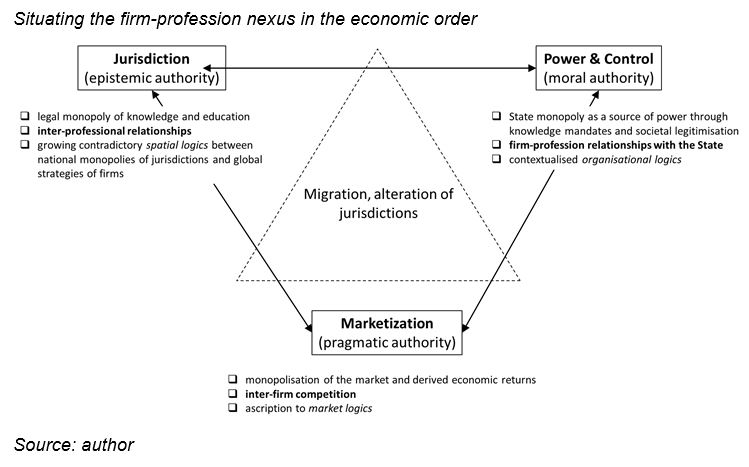– Sabine Dörry –
Despite major crises, financial capitalism is enjoying a period of relative stability. Financial powers – underpinned by the financialisation imperative of the 21st-century capitalist order – are robust and dynamically reinforce the global system’s principal traits and values. The advanced business services (ABS) sector ties in closely with these dynamics and shapes financial capitalism while benefiting disproportionately from it. Yet, ABS’ ability to form and ultimately dominate is little understood. This paper challenges the firm as the predominant unit of analysis and develops an innovative firm-cum-profession framework to comprehend how dynamics along this nexus are systemically entrenched to constitute and invigorate the hegemonic institutional power of contemporary financialisation.
The analytical inclusion of ABS professions is important because it has profoundly shaped the socio-economic landscape of and is intricately related to the processes of financialisation, globalisation, and neo-liberalisation. Yet, in contrast to these latter processes, professionalisation has received much less analytical attention as a vital factor shaping the knowledge-based services economy; and where it has been studied, the main focus remains on service firms. I engage with the analytical unit profession more effectively to shed light on its co-production of institutional power, and introduce a new conceptual framework, i.e., the firm-profession nexus. The argument starts from the observation that the ABS industry has been able to increasingly set and enforce standards defined by specific, financialised, epistemologies, which have since not only rewritten the economic and policy textbooks, but also shaped and reproduced dominant forms of expertise and professional practice. In tandem, ABS firms and professions have been sharing and mediating an orientation to economic success as ‘producers’ of professional bodies of knowledge (with knowledge being both a social product and a source of power, cf. Dingwall and Lewis, 2014 [1983]) and inscribed control over ‘epistemological’, ‘moral’ and ‘pragmatic’ authority with particular implications for the larger political and economic order, endorsed, however, by state recognition.
The ABS firm-profession nexus seeks to better understand the ‘hidden’ logics and organisational architectures that foster the institutionalisation of power beyond the analytical unit ‘firm’, and to analytically incorporate the professions and the state. The figure below suggests three analytical dimensions that inform the relational firm-profession nexus and the process of the institutionalisation of power: The first is concerned with professions and their jurisdiction along the mutually constituted linkages between formalised skill (jurisdiction) and applied skill (firms). The second dimension carves out the balances of power and control between firms, professions and the state. Whilst the state demands the supply of advanced business services for its own functioning, it grants legal monopolies to the professions but also regulates the activities of professions and firms. The third dimension focuses on the process of codification and marketization of the professional knowledge base to make it economically viable for firms and practitioners. The question related to this dimension is how the nexus oscillates organisationally, temporarily, and spatially to achieve jurisdictional authority. Each of the three processual dimensions are mutually defined by the dependent actor groups and ascribe to specific geographies that form the contemporary economy. It makes the firm-profession nexus an integral gatekeeping node in today’s financialised economy not least due to its capacity to build alliances with other influential groups and stakeholders.

I argue that ABS professions can wield far-reaching power in actively constructing and closing markets, formalising rules, creating transparency and increasing market competition, dominating other occupations, and negotiating regulative bargains with states in the interests of their own practitioners – in short, in creating and exploiting the institutional power that benefits firms and through which contemporary economic geographies are shaped. Whilst industrial capitalism and tools for the new managerial classes witnessed the ascendancy of management consultancies, the fundamental shift to essentially financialised economic activity has propelled the accountancy profession as much as corporate lawyers to the top of the pecking order of the ascendant ABS group as a whole. To be sure, this is not a zero-sum game; ABS have successfully broadened their influence over the past decades based on their increasingly recognised knowledge base, while increasing their political influence not least via revolving door mechanisms.
In general, economic geographers focus analytically on the firm as a main source of innovation, economic return and regional development. This article challenges this established view and suggests to include the additional layer ‘profession’ to better grasp further rationales in the financialised processes of innovative economic activity. The analysis introduces the firm-profession taxonomy as a broader heuristic to develop a better-informed understanding of the inner workings of the ABS industry.
Read more in the Financial Geography Working Paper #12.
